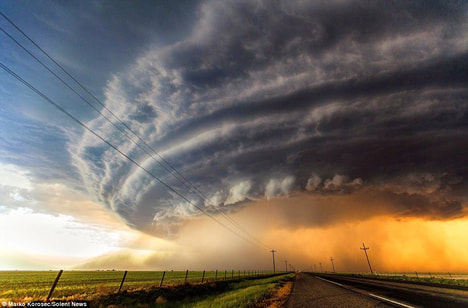all of the selves we Have ever been
 A storm is coming. I feel it as soon as I open my eyes. There is a change in temperature, humidity, air pressure, and the rhythm of my own heart. I awaken feeling both cautious and expectant. Outside my window, the world is upside down. The sky looks like a turbulent sea. Dark clouds tumble and crash like powerful waves rushing for the shore. I can smell the Atlantic Ocean from my third-floor-perch in Ohio. The everyday sounds of summer are quashed along with the sunshine. Absent is the roar of passing traffic. No doors creak open or slam shut. Neighbors’ voices are silent. Not even the birds are singing. The wind supplies the only soundtrack. Air moves through the trees whooshing and whistling. An empty soda can skips and scrapes across the pavement. The windows rattle, and the Venetian blinds bounce and bang against the window sill. I roll the tape and hear the voices of my parents saying, “Move away from that window!” There was a family thunderstorm protocol. As children do, we mirrored our parents when danger called. A storm was alive, like a stranger lurking outside the door. Children did what parents instructed. We mimicked the same serious, pensive moods of the adults. If we were playing outdoors as a storm drew near, we continued our activities, living on the edge, trusting that parents were ever alert and all-knowing. At the first distant flash of lightening or a warning crack of thunder, moms made haste to remove the whipping, snapping laundry from backyard clotheslines. The mother-sirens screamed, and the children scrambled. Bring in the toys! Find the dog! GET. INSIDE. NOW. Annual viewings of The Wizard of Oz provided children of my generation with effective storm education. We understood the trouble that comes to a child who fails to heed the word NOW. Once indoors it was off with electrical devices. Unplug the TV. That was surge protection. We drew the draperies and stayed away from windows and doors. Children found quiet things to do. We feigned distraction while remaining wary. Coloring books and Nancy Drew, Lincoln Logs and Hardy Boys kept us company. We were happy to have shelter. As the storm played out, we shuddered at strong claps of thunder and feared that pelting rain might break the glass. Despite its threatening power, there was beauty and majesty to a thunderstorm. Even as little children, we grasped a spiritual element to the weather and an understanding of things not just greater than us but forces greater than our parents too. When it was over, we were glad that our house had not fallen on us, though some magical ruby slippers would have been nice. We were equally grateful to be doing some minor clean-up out in the yard instead of wandering lost on a terrifying yellow-brick road. Occasionally, some items that had gotten loose in the wind might need to be returned to neighbors. That exchange usually led to some conversations about relief and gratitude. As the rain moves in, I find myself wishing we had been more careful with our words when the coronavirus slipped across the border. What if officials had described it as a weather event and a storm instead of an invisible enemy and a war? We live with seasonal weather events. We know what steps to take in a storm. Wars are unfamiliar; we don’t know what to do. Storm protocols demand compassion and cooperation. Wars breed hatred and mistrust. Warfare encourages resistance and violence. In a storm people choose safety, not sides. Rain and storms are temporary; they blow over. War changes life permanently; enemies are forever. We are happy to take shelter in a storm. Hiding from an enemy fuels outrage. We feel storms coming and a corresponding sense of urgency to calmly prepare and protect. The threat of war creates disbelief, naysayers, propagandists, and chaos. Storms bring out a spirit of community both in preparation and in recovery. In war, people hold their ground and their grudges; they fight over the spoils. During storms we remain vigilant but hopeful. Realistic and prayerful. We acknowledge the spiritual elements of nature and try to find meaning in our tempestuous circumstances. But in war, hope, faith, and meaning become casualties. Some people lose God and never recover their souls. It is easy to return a t-shirt or a pair of pajamas that blew from the clothesline in a storm. It is not so easy to gather up the bodies of neighbors that litter our lawns after a war. We can replace the roof and remodel the kitchen when the storm has passed. It is much harder to restore a livelihood that is in shambles or suture the shredded self-esteem that hangs from broken tree limbs. The insurmountable grief following war makes storm clean-up seem easy. Dorothy waited too long to get into the storm shelter. That decision led to an exhausting and uncertain journey. We sympathize. We are tired too. Our words matter in characterizing the things that happens to us. Hopefully, during the remainder of this pandemic, this virus storm, we can come to our senses, summon our courage, and find our hearts. We do not need ruby slippers to remind us that in a storm, there is no place like home.
0 Comments
Your comment will be posted after it is approved.
Leave a Reply. |
AuthorLilli-ann Buffin Archives
July 2024
Categories
All
|
 RSS Feed
RSS Feed